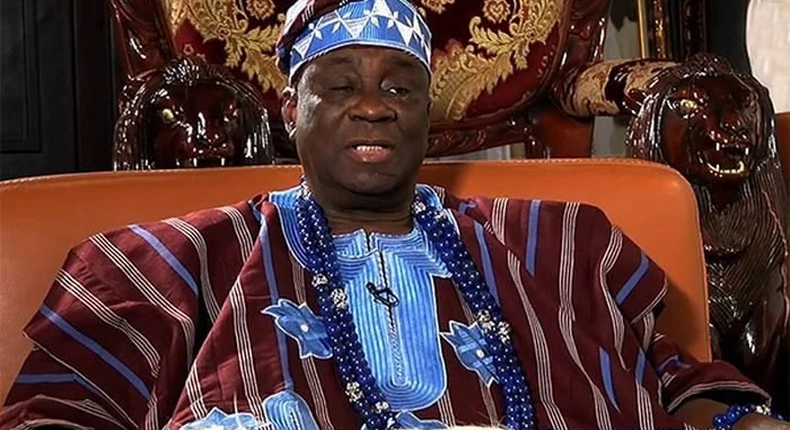Oba Rilwan Akiolu of Lagos has voiced his strong objection to the movie ‘Gangs of Lagos,’ accusing it of being defamatory and sacrilegious by falsely portraying the traditional ‘Eyo’ festival as criminal gangs involved in horrific murders and unleashing terror on innocent individuals.
In a detailed three-page letter sent on June 28, the traditional ruler conveyed his concerns to the management of Amazon Prime Nigeria and Greoh Ltd. regarding the film. Alongside the concerns, he outlined four conditions that the producers and promoters of the film were expected to comply with within a strict 14-day timeframe.
Akiolu issued a direct appeal to Amazon Web Service, Greoh Studios, and the film producers ‘to immediately remove, cease and desist from using the image getup and manifestation of the Eyo in the Gangs of Lagos.’
As stated by the traditional ruler, the film has had a detrimental impact on the reputation of the Eyo brand.
‘Gangs of Lagos’ has been a subject of controversies within the indigenous community of Lagos State since its release. The Isale Eko Descendants Union (IDU) has raised objections, contending that the film inaccurately depicts Isale Eko as a haven for criminals and characterizes the Eyo masquerade as a gang of killers.
Demanding N10 billion in damages, the descendants of Isale Eko have initiated a lawsuit against Amazon and other producers, alleging that the film ‘Gangs of Lagos’ has caused extensive damage to the reputation of the Eyo brand.
Akiolu, in his written message, sent a copy to Gov. Babajide Sanwo-Olu, emphasising that the movie’s unlawful depiction of the Eyo festival had caused substantial reputational damage to the Eyo brand.
Read also: ‘The Ancestors Are With You’ – Oba Of Lagos Blesses Tinubu
Furthermore, the traditional ruler contended that in the global context, individuals planning to visit Lagos might question the genuineness of the Eyo festival as an esteemed cultural heritage event that warrants honor and admiration.
Moreover, the traditional ruler asserted that the film producers had purposefully utilized the complete attire, undistinguishable image, and traditionally designed and ordained appearance of the Eyo festival, which forms an essential part of the cultural heritage of the indigenous people of Lagos, with the intention of commercial gain and exploitation.
It was highlighted by the traditional ruler that this action was undertaken without obtaining permission or making the required reference to the office of the Oba of Lagos.
‘I am the custodian and final authority of the Adimu Orisa and its manifestation the Eyo. These traditional rites are the tangible and intangible property of the indigenes of Lagos and these are their bundle of rights of our intellectual property in our cultural heritage.’
‘This cultural heritage is the legacy of physical artifacts and intangible attributes that has been inherited from past generations over two hundred years ago, maintained in the present by the Oba of Lagos and bestowed for the benefit of future generations.’
‘These traditions express our way of life and thought. They are proofs of our intellectual and spiritual achievements. They must not be used without the indigenous owners’ express permission or desecrated in any way whatsoever,’ he added.
According to the Oba, the film demonstrated an obvious disregard for the rights of the indigenous people of Lagos, flagrantly going against the principles set forth in the United Nations Declaration on the Rights of Indigenous Peoples in 2007.
Oba Akiolu pointed out that international law, as reflected in the declaration, protects the indigenous people’s essential right to practice and breathe new life into their cultural traditions and customs.
‘This includes the right to maintain, protect and develop the past, present and future manifestations of our cultures, including artifacts, designs, ceremonies, technologies and visual and performing arts and literature.’
Oba Akiolu, thus, insisted that the film’s use and depiction of the Eyo festival must cease without delay. He stressed that these actions flagrantly violate indigenous intellectual property rights and defame sacred rites.
Oba Akiolu also requested that the film producers present a proposal within 14 days, outlining their plans to restore the sanctity of the Eyo brand.
He demanded that the film producers ‘provide within 14 days compensatory proposal for the infringement of our intellectual property rights in our cultural heritage which you have commercially exploited without licence.’
The producers of ‘Gangs of Lagos’ were mandated by the traditional ruler to prepare, within a 14-day period, a draft of an apology that is properly worded and expresses remorse to the Oba of Lagos and the indigenous people of Lagos.

